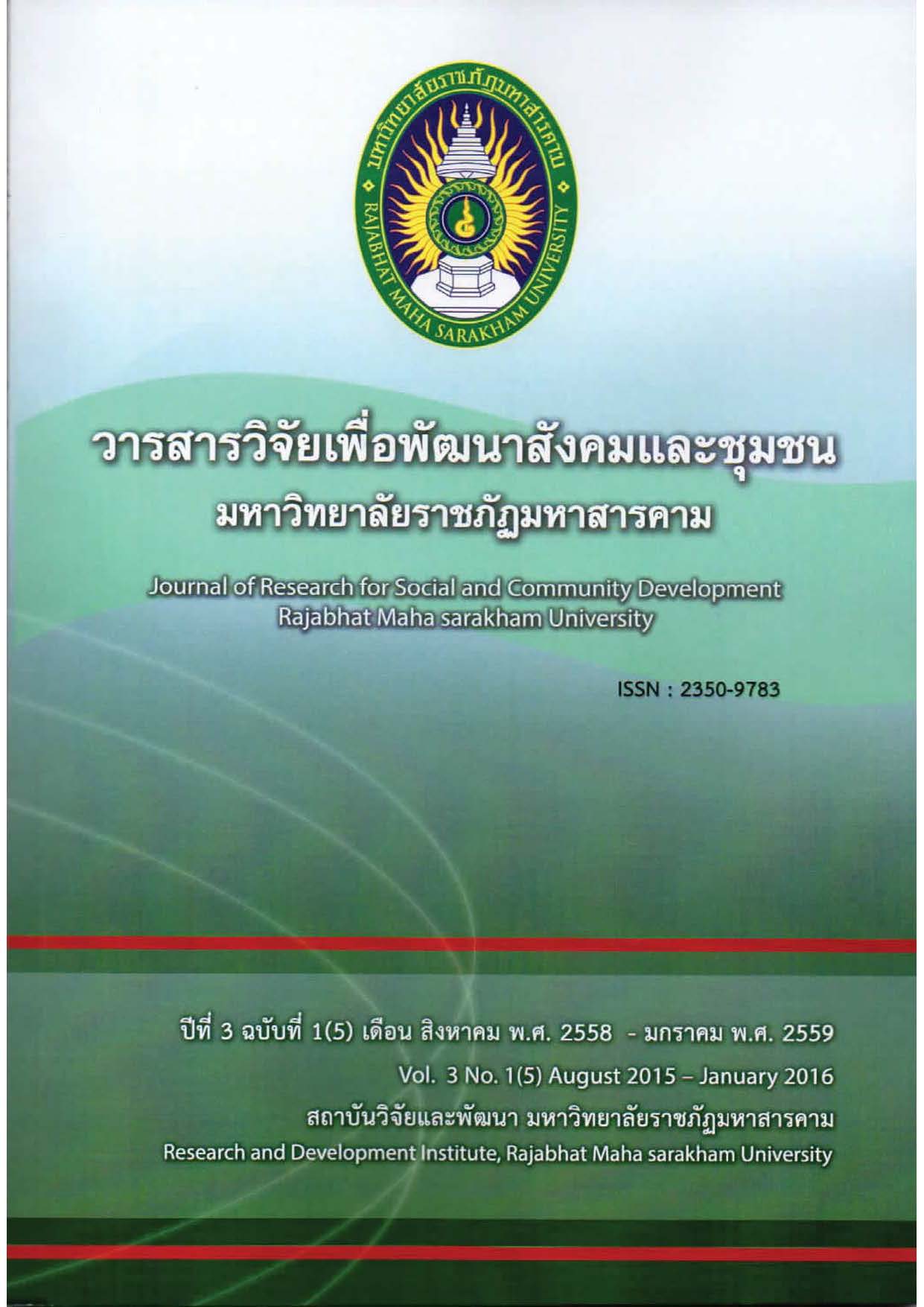Social Capital in the Development of Safe Rice Homnin Farmers School Enhancing the Quality Life.
Keywords:
S0cial Capital, Farmer School, Enhancing the Quality LifeAbstract
The research had the objectives to: (1) study the historical background of the farmers school of the farmers of Ban Hinlad, TambonWangnang, Muang District, MahaSarakham Province; (2) study the emergence of the social capitalin the development of safe rice Homnin of the farmers school of the farmers of Ban Hinlad; (3) synthesize the roles of the social Capital in the development of safe rice Homnin of the farmers school of the farmers of Ban Hinlad; (4) study the enhancement of the quality of life of farmers of Ban Hinlad that took place because of the social capital in the development of safe rice Homnin. The research methodology employed the mixed method of qualitative research and quantitative research. The target group comprised 20 farmers who were members of the farmers school. The setting was the farmers school of Ban Hinlad, Village No. 2, TambonWangnang, Muang District, MahaSarakham Province. The research instruments used consisted of a structured and unstructured interview form, a participatory and nonparticipatory observation form, guidelines for focus group and a focus group, an assessment form for quality of life of farmers, the report on the evaluation of the rice production system: GAP, the record of the rice quality management: GAP Rice of the plot for the farmer, and the form for basic assessment of the farmer’s plot: GAP Rice for the assessor. The statistics used were basic statistics which comprised the mean and standard deviation. The presentation of the results employed a descriptive analysis and schedule. The results are as follows: 1) Regarding the historical background of the farmers school of the farmers of Ban Hinlad, it was found that Ban Hinlad was a small village, about 100 years old, and had the same culture and traditions as other Esan communities in the Northeast. Its natural resources were the Kakang brook and a public pond. Regarding the villagers’ economy, the villagers took up rice farming as their occupation and had some additional occupations after rice growing season. The farmers school was set up because of the following: (1) the mainstream community development that emphasized economy that resulted in Ban Hinlad farmers’ rice growing for consumption and sale. It brought about high production cost, use of chemicals, chemical fertilizer and insecticides but the produce was low, so they were in debt and encountered poverty; (2) the village civil society tried to solve the low rice produce, debt and poverty by forming groups to set up the farmers school project in 2012 and the project was supported by the Ramajitti Institute and the Faculty of Education of Rajabhat MahaSarakham University, and the farmers school produced a 15-unit farmer’s curriculum and had 1 common rice farming demonstration plot. But the step of development that followed phase 1 was to grow chemical-free Homnin royal rice, so they joined each other to set up the social capitalin the development of safe rice Homnin of the farmers school of Ban Hinlad enhancing the quality of life. 2) The emergence of the social capitalin the development of safe rice Homnin of the farmers school of Ban Hinlad was caused by: (1) the alternative national development in which the farmers of the farmers school changed their behavior of growing Homnin rice by reducing using chemical fertilizer, pesticides, and turned to local wisdom. They made dry compost and made liquid herbal pesticide for the rice plots; (2) regarding resource management, they provided a plot of land for a common rice growing demonstration plot and used the Homnin seeds that were available in the community. They used dry manure of cow and buffalo dung as fertilizer; and (3) the participatory work that included academics and community learned persons who transmitted the knowledge of Homnin rice growing with quality specified by rice quality management: GAP comprised 7 components: water source, growing plot, using agricultural dangerous materials, production process, harvesting, moving and storage, and data recording of the agricultural plot. 3) The synthesis of the roles of the social capitalin the development of safe rice Homnin of the farmers school of Ban Hinlad revealed that the social capital had its roles relating to: (1) knowledge management on quality management system: GAP Rice, having social capital from both outside and inside the community transmit the knowledge of growing Homnin rice that meets the 7 GAP Standards: Rice; (2) organizations inside and outside the community formed several groups to develop the farmers school; and (3) the efficient work was caused by the farmers’ behavior of good relationship, generosity, forgiveness, and doing their assigned roles properly. 4) The assessment of the quality of life of the farmers in the farmers school of Ban Hinlad employed an assessment form that comprised 6 aspects, 44 indicators. The total reliability was 0.83. The results revealed that the quality of life of the farmers on the 6 aspects as a whole was in the highest level, and when considered by aspect, the aspects in the highest level were: social, mental, resource management, and health; the aspects in the high level were: production factors, and economy. Regarding the lesson drawing on the quality of life of the farmers in the farmers school, it was found that the farmers had very good quality of life, as well as revealed by the indicators, in the following aspects: social, resource management, mental, and health.
References
Downloads
Published
How to Cite
Issue
Section
License
Articles that are published are copyrighted by the authors of the articles







